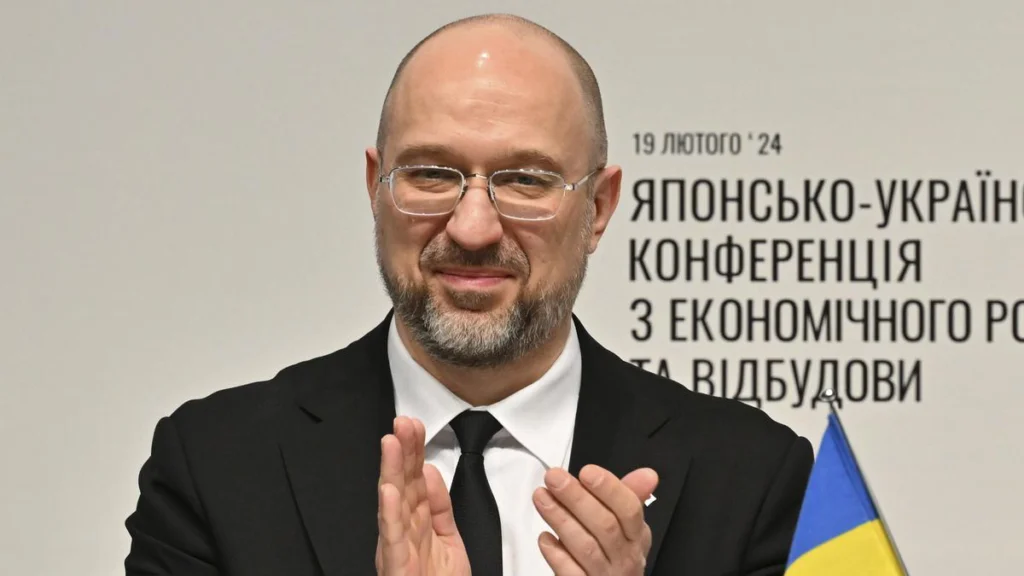Ukraine’s Zelensky proposes PM Shmyhal as new Defence Minister

Ukrainian President Volodymyr Zelensky has proposed Prime Minister Denys Shmyhal as the new Defence Minister. This change is part of a broader government reshuffling. Zelensky emphasized that Shmyhal’s leadership experience made him the right choice to handle Ukraine’s defense during the ongoing war with Russia. Shmyhal, who has served as Prime Minister since 2020, has been instrumental in managing Ukraine’s response to the conflict.
The proposal comes at a crucial time. Ukraine continues to face intense pressure from Russian forces. With the country’s security at risk, Zelensky wants to strengthen the coordination between the military and government leadership.
Why Shmyhal?
Shmyhal has long been involved in Ukraine’s governance. Before becoming Prime Minister, he served as the governor of Ivano-Frankivsk Oblast. His experience in economic and security policy makes him well-equipped to oversee the defense ministry. He has worked to secure foreign aid and military support, building strong ties with NATO and the European Union. These relationships are vital as Ukraine’s defense needs increase.
Shmyhal’s understanding of both economic and defense policies will help him manage Ukraine’s military operations. His diplomatic background allows him to navigate international relations effectively. With Russia’s ongoing aggression, it’s crucial to have a strong and experienced leader at the helm of the Defense Ministry.
Parliamentary Approval
Zelensky is confident that Ukraine’s parliament, the Verkhovna Rada, will support Shmyhal’s appointment. The parliament has already backed key government decisions during the war. Given Shmyhal’s track record, most lawmakers are likely to approve his new role. Zelensky believes that this change will allow for smoother decision-making and better coordination during the war.
Support from parliament would send a strong message of unity. It would show that the government is aligned in its mission to defend Ukraine. The ability to make quick decisions and take action will be crucial as the war continues.
Strengthening the Defense Ministry
As Defence Minister, Shmyhal would take charge of managing Ukraine’s military efforts. This role is more important than ever as Russia continues to pressure Ukraine. Shmyhal would need to oversee military operations, manage defense budgets, and ensure that the armed forces are adequately equipped.
The Defence Minister’s job involves not only managing daily operations but also strategic planning for the future. Shmyhal would be responsible for ensuring that Ukraine’s military remains effective, both in the short term and long term. He would also work to secure continued international support, particularly from NATO allies.
A Unified Government
This reshuffle is part of Zelensky’s strategy to ensure a unified leadership during the war. The President aims to streamline decision-making processes and improve communication between military and government officials. By placing Shmyhal in charge of defense, Zelensky hopes to create a more cohesive approach to Ukraine’s war effort.
Shmyhal’s leadership will be key in managing the defense ministry while also addressing Ukraine’s broader economic challenges. The war has placed a significant strain on the country’s resources. Shmyhal will need to balance military needs with economic recovery.
The Challenges Ahead
The Defence Minister role is not without its challenges. Ukraine’s military faces ongoing threats from Russia, and the country’s defense strategy will need to adapt to changing circumstances. Shmyhal will have to oversee the allocation of resources, ensuring that Ukraine’s military remains equipped to respond to evolving threats.
Shmyhal will also need to work closely with international allies. Securing continued military aid and financial support will be essential. Ukraine has relied heavily on Western support, and Shmyhal’s diplomatic skills will be critical in maintaining these relationships.
Shmyhal’s leadership will also be crucial for Ukraine’s post-war recovery. Once the conflict ends, the Defence Minister will play a key role in demobilizing forces and reintegrating soldiers into civilian life. This process will require careful planning and coordination to ensure a smooth transition.
International Reactions
International reactions to the proposal have been largely positive. Western allies have supported Zelensky’s efforts to strengthen Ukraine’s defense capabilities. Shmyhal’s appointment is expected to be well-received by NATO and the EU, as it signals continuity in Ukraine’s defense strategy.
The West has been a key partner for Ukraine, providing military aid, economic support, and diplomatic backing. Shmyhal’s experience in fostering these relationships will be crucial as Ukraine continues to seek international assistance in its fight against Russia.
Looking Forward
Zelensky’s proposal marks an important step in Ukraine’s wartime leadership. Shmyhal’s appointment would place him at the center of Ukraine’s defense strategy. His extensive experience in governance and diplomacy makes him well-equipped to lead the Ministry of Defense during such a challenging time.
As the war continues, Ukraine’s leadership will be tested. Shmyhal’s ability to coordinate military operations, secure international support, and plan for the future will be vital to Ukraine’s success. The proposal to appoint Shmyhal shows Zelensky’s commitment to strengthening Ukraine’s defense and ensuring that the country is ready for whatever challenges lie ahead.
Conclusion
The proposal to appoint Denys Shmyhal as Defence Minister is a crucial step for Ukraine. His leadership experience, both in government and defense, makes him the right choice for this critical role. By placing Shmyhal in charge of defense, Zelensky hopes to ensure a unified approach to the war effort. The approval of this proposal by Ukraine’s parliament will reinforce the government’s commitment to defending the country against Russian aggression. As the conflict continues, Shmyhal’s leadership will be essential in ensuring Ukraine’s military readiness and securing its future security.






